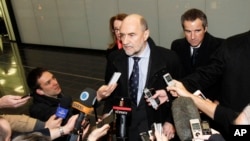The chief United Nations nuclear inspector has returned to Vienna from Iran with no new agreement on investigating allegations that the country is working to develop nuclear weapons.
Herman Nackaerts led the International Atomic Energy Agency team in the latest round of talks in Tehran, but said Thursday the two sides were unable to finalize a deal. He declined to say if any progress had been made.
Also, Thursday there were new indications Iran is taking new steps to rapidly advance its nuclear capabilities.
The Washington Post reports Tehran recently tried to buy tens of thousands of highly specialized ring-shaped magnets for its centrifuges from China. Those magnets are banned for export to Iran by U.N. resolutions and it is unclear whether Iran's attempt to acquire the magnets was successful.
Iran says its nuclear activity is strictly for peaceful purposes but a European diplomat with access to sensitive intelligence told the Post on condition of anonymity that the Iranians "are positioning themselves to make a lot of nuclear progress quickly."
On Wednesday, Iran's nuclear chief announced the country was adding thousands of more-advanced, second-generation centrifuges at its nuclear facilities. The upgrade would allow Iran to significantly increase its production of enriched uranium.
The chief U.N. inspector says the IAEA remains committed to negotiations with Iran and needs more time to reflect on the next steps. No date has been set for future talks.
Iran's state-run news agency had reported Wednesday that the two sides agreed on "some points," but did not offer details.
Another international effort to address concerns about Iran's nuclear program comes February 26, when Iran is set to meet in Kazakhstan with the United States, Britain, China, France, Russia and Germany.
Herman Nackaerts led the International Atomic Energy Agency team in the latest round of talks in Tehran, but said Thursday the two sides were unable to finalize a deal. He declined to say if any progress had been made.
Also, Thursday there were new indications Iran is taking new steps to rapidly advance its nuclear capabilities.
The Washington Post reports Tehran recently tried to buy tens of thousands of highly specialized ring-shaped magnets for its centrifuges from China. Those magnets are banned for export to Iran by U.N. resolutions and it is unclear whether Iran's attempt to acquire the magnets was successful.
Iran says its nuclear activity is strictly for peaceful purposes but a European diplomat with access to sensitive intelligence told the Post on condition of anonymity that the Iranians "are positioning themselves to make a lot of nuclear progress quickly."
On Wednesday, Iran's nuclear chief announced the country was adding thousands of more-advanced, second-generation centrifuges at its nuclear facilities. The upgrade would allow Iran to significantly increase its production of enriched uranium.
The chief U.N. inspector says the IAEA remains committed to negotiations with Iran and needs more time to reflect on the next steps. No date has been set for future talks.
Iran's state-run news agency had reported Wednesday that the two sides agreed on "some points," but did not offer details.
Another international effort to address concerns about Iran's nuclear program comes February 26, when Iran is set to meet in Kazakhstan with the United States, Britain, China, France, Russia and Germany.

